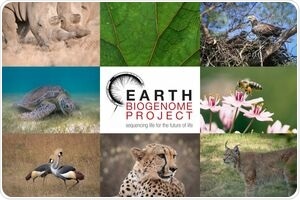The strategy for better understanding, management, and restoration of biodiversity and ecosystem services is to sequence the genomes of all plants, animals, fungi, and other microbial species on Earth.

Biodiversity and the Earth BioGenome Project. Image Credit: J. Zwilling/O.Krone/unsplash/EBP.
On this goal, the Leibniz Institute for Zoo and Wildlife Research (Leibniz-IZW) and scientists working on the European Reference Genome Atlas (ERGA) collaborate with the Earth BioGenome Project (EBP) to develop a global network of experts and improve sequencing skill and capacity.
As it proceeds from pilot projects to full-scale “production” sequencing, the EBP is rapidly transforming the way. The project’s goals, successes to date, and next stages are described in a collection of papers published in the Proceedings of the National Academy of Sciences of the United States (PNAS).
Scientists are forming genomic consortia all over the world to generate high-quality, error-free genome sequencing of all species. These resources could be critical in addressing fundamental biological problems, which are biological preservation and health and disease research.
Genomics is a fast-evolving discipline that aims to study the entire genetic repertoire of species as well as differences and interactions among individuals, populations and communities. Genomic-associated technology has the capacity to generate large amounts of data in a short-time for any given specimen and therefore can be used as a dynamic and multi-purpose tool to support actions against the ongoing mass extinction crisis.”
Dr Camila Mazzoni, Scientist, Leibniz Institute for Zoo and Wildlife Research
Mazzoni is also the chairperson of ERGA. She further adds, “Generating reference genomes of the entire eukaryotic biodiversity is a moon shot endeavor that can only be approached via a large collaborative and well-coordinated worldwide effort.”
“Major and minor projects—under the umbrella of EBP—such as the Vertebrate Genomes Project (VGP), Darwin Tree of Life (DToL), European Reference Genome Atlas (ERGA) and Africa BioGenome Project (AfricaBP) will together change the tools currently existing for analyzing biodiversity and hence provide the way for a deeper understanding.”
The Earth BioGenome Project functions as an international network of networks that coordinates multiple organization, local, and nationwide activities, such as the California Conservation Genome Project in the United States, the Darwin Tree of Life in the Great Britain and Ireland, or the ERGA in Europe.
The special feature of the EBP captures the essence and excitement of the largest-scale coordinated effort in the history of biology. Earth is forecast to lose 50% of its biodiversity by the end of this century without action to curb climate change and protect the health of global ecosystems.”
Harris Lewin, Distinguished Professor, Evolution and Ecology, University of California, Davis
Also being the chair of the EBP Working Group, Lewin added, “Creating a digital library of DNA sequences for all known eukaryotic life can help generate effective tools for preventing biodiversity loss and pathogen spread, monitoring and protecting ecosystems, and enhancing ecosystem services. Achieving the ultimate goal of sequencing all eukaryotic life now seems within our reach.”
The EBP, which was launched in November 2018, aims to offer a comprehensive DNA sequence database of all 1.8 million plant, animal, and fungus species, as well as single-celled microbial eukaryotes. The EBP has completed its start-up phase and is presently in phase 1 (which will last until 2023) with the ambitious goal of producing reference genomes for around 9,400 taxonomic groupings.
The affiliated projects have generated around 200 reference genomes until now, with another 3,021 projected to be sequenced, assembled, and annotated by the end of 2022, accounting for 34% of the phase 1 objective.
In 22 countries on every continent except Antarctica, 5,000 scientists and technical employees from 44 member institutions are part of the project, as of December 2021. There are 49 linked projects representing access to lots of samples from museums and field biologists, including most major taxonomic families of eukaryotes.
The Africa BioGenome Project was recently formed by a collection of African universities from 22 countries. BIOSCAN, which utilizes DNA barcode technology to detect and classify species, and the Global Virome Project, which is looking for novel viruses that could cause pandemics, have both joined as affiliates.
Developing and assessing scientific standards of quality and strategies, coordinating local, national, and multinational projects, and forming networks via regular working committee meetings and an annual conference were among the primary activities of the first three years.
The EBP has developed committees on Ethics, Legal and Social Issues (ELSI) and Justice, Equity, Diversity, and Inclusion (JEDI) in addition to the International Scientific Committee, which establishes project criteria.
The biodiversity genomics community and indigenous communities in the world’s most biodiverse countries will benefit from EBP’s proactive tool for understanding ethical, legal, and social issues surrounding the project, which will inform suggestions on access and commercial benefit-sharing, inclusion, and equity’ in the biodiversity genomics group and indigenous communities.
Source:
Journal reference:
Lewin, H. A., et al. (2022) The Earth BioGenome Project 2020: Starting the clock. Proceedings of the National Academy of Sciences of the USA. doi.org/10.1073/pnas.2115635118.